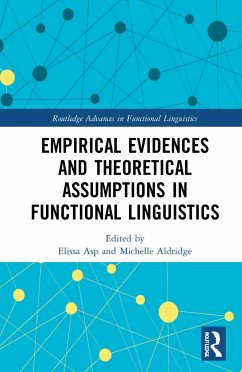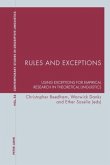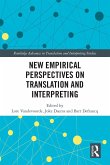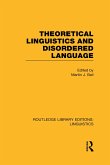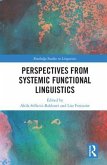Empirical Evidences and Theoretical Assumptions in Functional Linguistics
Herausgeber: Asp, Elissa; Aldridge, Michelle
Empirical Evidences and Theoretical Assumptions in Functional Linguistics
Herausgeber: Asp, Elissa; Aldridge, Michelle
- Gebundenes Buch
- Merkliste
- Auf die Merkliste
- Bewerten Bewerten
- Teilen
- Produkt teilen
- Produkterinnerung
- Produkterinnerung
This collection explores the relationships between theory and evidences in functional linguistics, bringing together perspectives from both established and emerging scholars.
Andere Kunden interessierten sich auch für
![Rules and Exceptions Rules and Exceptions]() Rules and Exceptions80,20 €
Rules and Exceptions80,20 €![New Empirical Perspectives on Translation and Interpreting New Empirical Perspectives on Translation and Interpreting]() New Empirical Perspectives on Translation and Interpreting168,99 €
New Empirical Perspectives on Translation and Interpreting168,99 €![Theoretical Bases of Indo-European Linguistics Theoretical Bases of Indo-European Linguistics]() Winfred P. LehmannTheoretical Bases of Indo-European Linguistics91,99 €
Winfred P. LehmannTheoretical Bases of Indo-European Linguistics91,99 €![Theoretical Linguistics and Disordered Language (RLE Linguistics B Theoretical Linguistics and Disordered Language (RLE Linguistics B]() Theoretical Linguistics and Disordered Language (RLE Linguistics B167,99 €
Theoretical Linguistics and Disordered Language (RLE Linguistics B167,99 €![Perspectives from Systemic Functional Linguistics Perspectives from Systemic Functional Linguistics]() Perspectives from Systemic Functional Linguistics204,99 €
Perspectives from Systemic Functional Linguistics204,99 €![Introducing Systemic Functional Linguistics Introducing Systemic Functional Linguistics]() Introducing Systemic Functional Linguistics177,99 €
Introducing Systemic Functional Linguistics177,99 €![Theoretical Comparative Syntax Theoretical Comparative Syntax]() Naoki FukuiTheoretical Comparative Syntax140,99 €
Naoki FukuiTheoretical Comparative Syntax140,99 €-
-
-
This collection explores the relationships between theory and evidences in functional linguistics, bringing together perspectives from both established and emerging scholars.
Produktdetails
- Produktdetails
- Verlag: Routledge
- Seitenzahl: 198
- Erscheinungstermin: 28. Juli 2022
- Englisch
- Abmessung: 235mm x 157mm x 15mm
- Gewicht: 445g
- ISBN-13: 9780367143503
- ISBN-10: 036714350X
- Artikelnr.: 63117936
- Herstellerkennzeichnung
- Libri GmbH
- Europaallee 1
- 36244 Bad Hersfeld
- gpsr@libri.de
- Verlag: Routledge
- Seitenzahl: 198
- Erscheinungstermin: 28. Juli 2022
- Englisch
- Abmessung: 235mm x 157mm x 15mm
- Gewicht: 445g
- ISBN-13: 9780367143503
- ISBN-10: 036714350X
- Artikelnr.: 63117936
- Herstellerkennzeichnung
- Libri GmbH
- Europaallee 1
- 36244 Bad Hersfeld
- gpsr@libri.de
Elissa Asp is Professor of English and Linguistics at Saint Mary's University, Canada. Ongoing research addresses: (a) discourse correlates of dementias - especially neurodegenerative diseases associated with ageing; (b) magnetoencephalography (MEG) studies of neurocognitive networks supporting language production; and (c) the theoretical implications of (a) and (b) for models of language. Michelle Aldridge is a Reader in the Centre for Language and Communication Research (ENCAP) at Cardiff University. Her research focus is the linguistic experiences of vulnerable people (children, rape victims and people with a disability) within the legal and/or educational setting. Her data are typically analysed within a Cognitive Linguistics framework.
1. Introduction
2 Using neurolinguistic and neuropsychological evidences to address
theoretical questions in functional linguistics
3 Keystroke logging data: What can it tell us about mode and written
language production?
4 The influence of experiential aspects of meaning on the translation
process
5 On the process of choosing in translational logogenesis
6 Lexical Cohesion: Dimensions and Linguistic Properties of Chains in
English and German
7 The cohesive landscape of English of-NPs: an empirical,
expression-centred approach to coherence
8 Challenging instantiation in modelling movement-based multimodal
communication
9 Epilogue
2 Using neurolinguistic and neuropsychological evidences to address
theoretical questions in functional linguistics
3 Keystroke logging data: What can it tell us about mode and written
language production?
4 The influence of experiential aspects of meaning on the translation
process
5 On the process of choosing in translational logogenesis
6 Lexical Cohesion: Dimensions and Linguistic Properties of Chains in
English and German
7 The cohesive landscape of English of-NPs: an empirical,
expression-centred approach to coherence
8 Challenging instantiation in modelling movement-based multimodal
communication
9 Epilogue
1. Introduction
2 Using neurolinguistic and neuropsychological evidences to address
theoretical questions in functional linguistics
3 Keystroke logging data: What can it tell us about mode and written
language production?
4 The influence of experiential aspects of meaning on the translation
process
5 On the process of choosing in translational logogenesis
6 Lexical Cohesion: Dimensions and Linguistic Properties of Chains in
English and German
7 The cohesive landscape of English of-NPs: an empirical,
expression-centred approach to coherence
8 Challenging instantiation in modelling movement-based multimodal
communication
9 Epilogue
2 Using neurolinguistic and neuropsychological evidences to address
theoretical questions in functional linguistics
3 Keystroke logging data: What can it tell us about mode and written
language production?
4 The influence of experiential aspects of meaning on the translation
process
5 On the process of choosing in translational logogenesis
6 Lexical Cohesion: Dimensions and Linguistic Properties of Chains in
English and German
7 The cohesive landscape of English of-NPs: an empirical,
expression-centred approach to coherence
8 Challenging instantiation in modelling movement-based multimodal
communication
9 Epilogue

